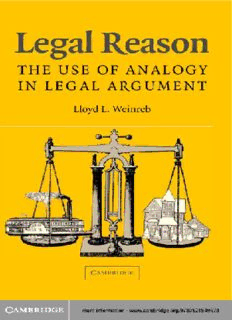
Legal Reason: The Use of Analogy in Legal Argument PDF
Preview Legal Reason: The Use of Analogy in Legal Argument
This page intentionally left blank LEGAL REASON LegalReasondescribesandexplainstheprocessofanalogicalreasoning, whichisthedistinctivefeatureoflegalargument.Itchallengesthepre- vailingview,urgedbyEdwardLevi,CassSunstein,RichardPosner,and others, which regards analogical reasoning as logically flawed or as a defectiveformofdeductivereasoning.Itshowsthatanalogicalreason- inginthelawisthesameasthereasoningusedbyallofusroutinelyin everydaylifeandthatitisavalidformofreasoningderivedfromthein- natehumancapacitytorecognizethegeneralintheparticular,onwhich thoughtitselfdepends.Theuseofanalogicalreasoningisdictatedbythe natureoflaw,whichrequirestheapplicationofrulestoparticularfacts. Writtenforscholarsaswellasstudents,practitioners,andpersonswho aregenerallyinterestedinlaw,LegalReasoniswritteninclear,accessible prose,withmanyexamplesdrawnfromthelawandeverydayexperience. LloydL.WeinrebisDaneProfessorofLawatHarvardLawSchool.Heis theauthorofNaturalLawandJusticeandOedipusatFenwayPark:What RightsAreandWhyThereAreAny. Legal Reason THE USE OF ANALOGY IN LEGAL ARGUMENT LLOYD L. WEINREB HarvardLawSchool Cambridge,NewYork,Melbourne,Madrid,CapeTown,Singapore,SãoPaulo Cambridge University Press TheEdinburghBuilding,Cambridge,UK PublishedintheUnitedStatesofAmericabyCambridgeUniversityPress,NewYork www.cambridge.org Information on this title: www.cambridg e.org /9780521849678 ©LloydL.Weinreb2005 Thisbookisincopyright.Subjecttostatutoryexceptionandtotheprovisionof relevantcollectivelicensingagreements,noreproductionofanypartmaytakeplace withoutthewrittenpermissionofCambridgeUniversityPress. Firstpublishedinprintformat2005 - ---- eBook(EBL) - --- eBook(EBL) - ---- hardback - --- hardback - ---- paperback - --- paperback CambridgeUniversityPresshasnoresponsibilityforthepersistenceoraccuracyof sforexternalorthird-partyinternetwebsitesreferredtointhisbook,anddoesnot guaranteethatanycontentonsuchwebsitesis,orwillremain,accurateorappropriate. Contents Preface pagevii Introduction 1 1 AnalogyandInductiveandDeductiveReasoning 19 2 Steamboats,BroadcastTransmissions,andElectronic Eavesdropping 41 3 AnalogicalLegalReasoning 65 4 AnalogicalReasoning,LegalEducation,andtheLaw 123 AppendixA:NoteonAnalogicalReasoning 163 AppendixB:BiographicalNotes 169 Notes 173 Index 181 [v] Preface Recentdiscussionsoftheuseofanalogyinlegalargument,whichmea- sureitsuseagainstthestandardsofdeductiveandinductivereasoning andfinditwanting,promptedmetowritethisbook.Eventhosewhohave approvedtheuseofanalogicalargumentinthelaw,likeEdwardLeviin hisclassicstudy,AnIntroductiontoLegalArgument,havethoughtitis rationally“flawed,”althoughhowinthatcaseitcouldhavethebenignef- fectsthatLeviandothersattributetoitisnotexplained.Soalso,effortsto reconstructanalogicallegalargumentasonlyaslightlydisguisedform of deductive or inductive argument, or some combination of the two, distorttheargumentsthatlawyersandjudgesactuallymakeandareev- identlydictatedonlybytheconvictionthatotherwisetheargumentsare invalidandentitledtonoweight. Viewsofthiskind,whichhavedominatedthediscussionaboutana- logicallegalreasoning,flyinthefaceoftheindubitablefactthattheuse ofanalogyisattheverycenteroflegalreasoning,somuchsothatitis regardedasanidentifyingcharacteristicnotonlyoflegalreasoningitself butalsooflegaleducation.Itissimplynotcrediblethatargumentssub- jectedroutinelytotheclosestscrutinywouldcontainsuchfundamental error. Studying the matter, I confirmed my belief that the use of ana- logicalargumentinlawstandsuponitsowntermsandisnotdifferent fromthereasoningonwhichweallrelyintheaffairsofeverydaylife.Its [vii] Preface useinthelawisdistinctonlyinthatitisnotmerelycommonplaceand useful but is essential to preservation of values that we ascribe to “the ruleoflaw.”Theefforttodisplaceanalogicalreasoningbydeductiveor inductivereasoningrespondstoamistakenbeliefthattheruleoflawso requires.Analogicalreasoningdoesnotunderminetheruleoflawbut rathersustainsit. Iintendthisbookbothforthosewhoareinterestedinthescholarly debateandthosewhoarebeginningtheirlegalstudiesorjustentering the practice of law, as well as persons who have a general interest in law.Addressingmyselftotheseaudiences,Ihavenotscanteddiscussion oftheissues.Ihave,however,omittedmostoftheapparatus–lengthy footnotesaboutmarginallyrelevantpointsandextensivecitation–that is,excessivelyIthink,commontolegalscholarship.Ihavebeengenerous withcommonplaceexamplesandwithexplanationsofmattersthatwill befamiliartolegalscholarsandexperiencedpractitionersbutperhaps nottobeginningstudents,practitionersstartingout,andothersoutside thelegalprofession. Iamgratefultomanycolleaguesandfriendswhoreadsomeorallof themanuscriptandmadefruitfulsuggestions,amongwhomareBrian Bix,MichaelDoyen,RichardFallon,RobertFerguson,MortonHorwitz, Daniel Meltzer, Anton Metlitsky, Daniel Weinreb, Mark Yohalem, and Benjamin Zipursky. AndrewWaterhouse,GeorgeBorg,andMarciaChapinhelpedmeto understandthechemistryofwinestainsandtalcumpowder.Ipresented someoftheideasinthebookatworkshopsatCornellLawSchool,Ford- ham Law School, and Harvard Law School and was encouraged and stimulatedbycommentsoftheparticipants. ThelibraryofHarvardLawSchoolprovidedreadyaccesstobooks andarticlesaboutawidevarietyofsubjects,includingmanythatdidnot makeitintothefinalmanuscript.ThelibraryofFordhamLawSchoolwas similarlyhelpfulwhenIwasavisitingprofessortherein2003.Melinda Eakin prepared and managed many drafts of the manuscript and as- sistedinthefinalcopyediting.Herhelpwasinvaluable.EdParsonswas agenerousandhelpfulrepresentativeofCambridgeUniversityPress. LloydL.Weinreb October2004 [viii]
Description: